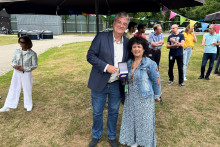Country of origin: Eritrea
Favorite author: Robert Ludlum
Favorite film: Star Trek
Favorite TV series: Earth's Final Conflict
Favorite leisure time activity: reading
Favorite food: pasta à la Eritrea with lots of hot pepper
Favorite place to be: 'my living room'
Favorite spot in the Netherlands: Enschede
Worst part about living in the Netherlands: lonely Sunday afternoons
Best part about living in the Netherlands: learning cutting-edge technology
Andemariam Teclai Tecle bears a name charged with meaning. His middle and family names express the notion of being rooted. Appropriately, he feels the tug of his roots drawing him back to his homeland of Eritrea. Andemariam comes from the capital, Asmara, a picturesque city whose longtime Italian colonizers left extraordinary italianate architecture amid palm trees and outdoor cafes. At home, he speaks both Tigrigna, one of the two national Eritrean languages (the other is Arabic) and Amharic, an Ethiopian language students learned during the thirty years Eritrea fell under Ethiopian rule.
After earning a degree in Biology at Asmara University, Andemariam taught high school biology for one year in Asmara. There the young Eritrean witnessed the difficulties students have mastering fundamental scientific concepts and began to contemplate what role he might play in restructuring how to teach them more effectively.
Through NUFFIC (Netherlands Organization for International Cooperation in Higher Education), Andemariam spent 1998-1999 at the UT's International Masters Program in Educational Science and Technology. When he first arrived, Andemariam found teaching styles frustrating. He was accustomed to a teacher-centered method where the teacher imparts knowledge that students subsequently memorize and regurgitate upon command. At the UT he discovered a student-centered approach featuring groupwork and lively discussions. Ultimately he observed the efficacy of this system in helping students to assimilate information. His goal became to import this method to his homeland.
Meanwhile, Eritrea and Ethiopia were waging a new war because of disputes over the border which had not been precisely delineated when Eritrea earned its independence from Ethiopia in 1993. Andemariam felt drawn by his roots to return and join the Eritrean Defense Force, which drafted him into national service in May 2000. Officially young draftees underwent military training for six months and then fought in the war for the remaining twelve months of theirservice. Due to utter chaos in spring 2000, Andemariam's training was condensed into one month. Fortunately a peace accord was signed in June 2000, freeing him from entering into battle. He spent the next months working for the government in a teacher training program, until he received word that he had been awarded a doctoral fellowship from UT. On April 27, 2001, Andemariam set off to continue his studies in educational technology. He left behind his beloved wife, Selamawit whom he had married less than a year earlier.
In Andemariam's doctoral work, he designs teacher support materials that implement a student-centered approach. Next month Andemariam will return to Asmara to test his ideas on Eritrean teachers. For six months, he will conduct a field test using lesson materials he has designed on diffusion and osmosis, a topic which posed particular difficulties for him when working as a teacher. In workshops and video demonstrations, he will show teachers how they can implement the student-centered approach while teaching diffusion and osmosis in five lessons. With the results from these classrooms, Andemariam will return to UT for a second phase of material development.
Once he has earned his PhD, Andemariam wishes to return to his native country to share the knowledge he has acquired at UT. He speaks of the 'brain drain' which Eritrea experiences as bright, ambitious young scholars leave their poor country for the lure of lucrative careers in Europe and North America. Eritrea faces severe problems: food and water shortage (only 22% of the population has access to safe drinking water), poverty, illiteracy, resettling of people uprooted by war and famine. Feeling the pull of his roots, Andemariam seeks to join the struggle to lift Eritrea from its distressing situation.








